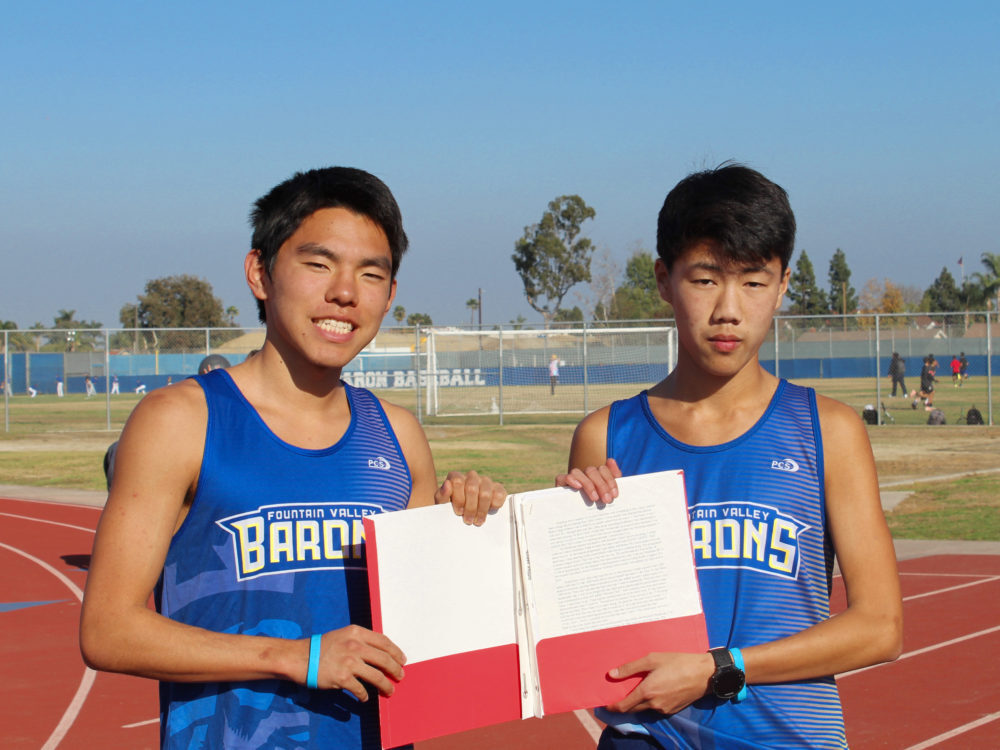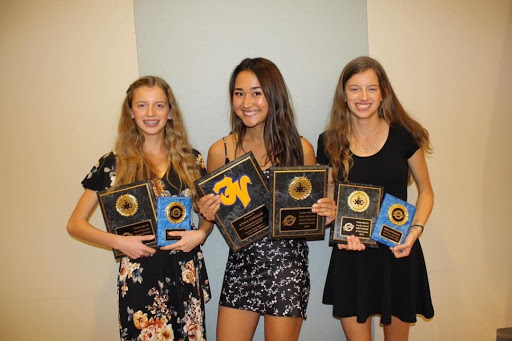
By Justin Hsieh, Staff Writer
Many sports teams have their own, special traditions that distinguish them from other teams and give them a sense of identity and community. One such custom, practiced by the Fountain Valley High School (FVHS) cross country team, has been inspiring athletes at FVHS for over two decades: the legacy tradition.
“The legacy book tradition allows a senior to write and gift a narrative account of their experience in cross country to a freshman or sophomore who they choose to continue their legacy… the senior will typically offer words of encouragement and advice in this manuscript, which can range from a single page to the length of a short book and is typically handed from the senior to the lowerclassman in a ceremony during the post-season banquet,” said Boys’ Assistant Coach Luis Morales.
Morales, himself an alumnus of the FVHS cross country program, received a legacy book as a freshman from Eric Dyson, the top varsity runner of the class of 2008. Morales passed on that book in the fall of 2010, and it has since passed through three other athletes before reaching its current holder, a sophomore, in the fall of 2017. This chain of inheritance, which is reflective of many of the currently living legacy books, is one of the most critical aspects of the tradition.
“Through maintaining a multi-generational chain of legacies, runners take pride in contributing positively to the rich history of Fountain Valley running. It also encourages runners that receive a book to compete in all of their remaining cross country seasons, so that they may hand a book off as a senior, and maintain their legacy’s ancestry,” said Morales. “If a legacy holding athlete quits, the chain of all legacies that came before vanish.”
Not all legacy books, however, have such long histories. Seniors who do not receive legacies as freshmen or sophomores can start their own. This was the case this year for senior Nicholas Mockus, boys’ team captain and one of two male legacy givers of the class of 2019.
“In my case, since I never received a legacy book, I had the honor of starting my own legacy book,” said Mockus. “It feels like even though I am graduating I am leaving part of myself behind to help guide and advise future runners.”
Whether they pass on an old legacy book or start a new one, giving a book is a powerful opportunity for graduating seniors to leave a lasting contribution to the culture of their team by choosing an underclassman that they see themselves in, and offering some of their hard-earned wisdom and experience to shape the recipient into a better runner and leader. For this reason, it is considered a high honor both to give and receive a legacy book.
“When Nick gave me his legacy I was surprised, first because I didn’t think I would receive one and second [because] there were many other people he could have chosen from, yet it was me. That will be my most memorable moment of this year; it made me feel like I do stand out in our team,” said sophomore Dezi Hernandez, who received Mockus’ legacy this year.
However, the legacy tradition is not only an exciting custom for the individual givers and recipients – it’s also an opportunity for seniors to reflect on their last four years and offer some insight to the entire team. During the ceremony at the banquet where legacy books are given, seniors from both the boys’ and girls’ teams give speeches recounting their experience to all in attendance.
“The legacy tradition has always been a real tear jerker for me, because I’m a sucker for live speeches about inspiration and friendships,” said senior Anna Goeller, one of the four graduating girls this year. “My personal experience was empowering, because I wouldn’t consider myself a good public speaker, but I felt a sense of pride when sharing my cross country experience.”
Goeller, who started her own legacy book, is an exception in the legacy tradition for two reasons. Not only did she pass her legacy to a junior rather than a freshman or sophomore, she chose two recipients for her legacy: twin sisters Ellie and Grace Peterson.
[caption id="attachment_67377" align="alignnone" width="512"] Senior Anna Goeller and her two legacy recipients, juniors Ellie [left] and Grace Peterson [right], at the 2018 cross country banquet. Photo courtesy of Anna Goeller.
Senior Anna Goeller and her two legacy recipients, juniors Ellie [left] and Grace Peterson [right], at the 2018 cross country banquet. Photo courtesy of Anna Goeller.
“I was really honored to be chosen by Anna. We have become such great friends through running, [and] it means so much to me that she chose us because she is such a talented runner and is always so generous and kind to everyone,” said Ellie Peterson. “The legacy book tradition is very important to me because I feel that the underclassmen really look up to the seniors as leaders when they join the team.”
This sense of interclass connection, which is crucial in all sports teams, is especially important in cross country, a sport infamous for its embrace of pain and extreme mental and physical demand. One of the chief factors in retaining members in a sport where athletes run anywhere from 30 to 60 miles a week is a robust team culture, which the legacy tradition works to build.
“To me the legacy tradition makes a sense of a team in this sport; I think it’s really important that newer runners get to know how older runners have gotten to where they are, especially in such a tough and challenging sport,” said Grace Peterson. “When Anna gave me her legacy, I was very excited and I knew I would have to keep the great legacy going.”
The FVHS cross country team’s legacy book tradition builds several of the universal athletic virtues – community, communication, and motivation. In doing so, it also gives athletes a chance to contribute to something greater than themselves, and leave behind a story that can last for generations.





